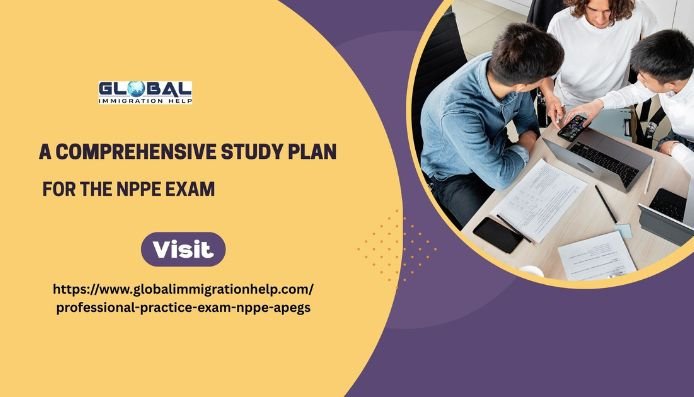A Comprehensive Study Plan for the NPPE Exam
Are you preparing to take the National Professional Practice
Exam (NPPE)? Are you looking for a solid study plan to help you ace the exam
with confidence? In this blog, we will provide you with a comprehensive
guide on how to create an effective study plan for the NPPE.
Introduction
The NPPE is a crucial exam for individuals seeking to become
licensed professional engineers in Canada. It assesses candidates'
understanding of the laws, regulations, and ethical standards that govern the
engineering profession. Adequately preparing for the NPPE is essential to
passing the exam and advancing in your career.
Understanding the NPPE
What is the NPPE?
The
National Professional Practice Exam (NPPE) is a standardized
exam administered by the provincial engineering regulatory bodies in Canada. It
is designed to test candidates' knowledge and understanding of the professional
practice of engineering.
Purpose and significance
Passing the NPPE is a mandatory requirement for obtaining a
professional engineering license in Canada. It demonstrates your competence and
readiness to practice engineering professionally and ethically.
Format and structure of the exam
The
NPPE
consists of multiple-choice questions that cover various topics such as law
and professional ethics, professional practice, and risk management. The exam
is typically four hours long and requires candidates to demonstrate their
understanding of key engineering concepts.
Creating a Study Schedule
Assessing your current knowledge and
skills
Before creating a study plan, assess your strengths and
weaknesses in the different exam topics. This will help you focus on areas
where you need improvement.
Setting realistic study goals
Establish achievable study goals that align with your exam
date. Break down the exam topics into manageable sections to study each day.
Crafting a Consistent Study Routine
It's important to set up a study schedule that covers all
your exam topics. Make sure to block out time for actually studying, going over
the material, and practicing sample questions.
Allocate time for each topic
Ensure that you allocate sufficient time for each topic to
cover all the material before the exam date. Use a calendar or study planner to
track your progress.
Include breaks to avoid burnout
Remember to include breaks in your study routine to prevent
burnout. It's important to take regular breaks to keep your focus and productivity
levels up. Be sure to squeeze in some short breaks to unwind and re-energize.
Your brain will thank you.
Study Resources
Recommended textbooks and study
guides
Utilize textbooks and study guides recommended by the
regulatory body or industry professionals to supplement your study materials.
Online resources and practice exams
Take advantage of online resources and practice exams to
familiarize yourself with the exam format and question types. Practice
answering questions under timed conditions to simulate exam pressure.
Joining study groups or forums for
discussion and support
Engage with peers or join study groups to discuss exam
topics, share study tips, and seek support and motivation from others preparing
for the NPPE.
Effective Study Techniques
Stay Engaged with Your Reading
Material
Don't just skim through the words on the page - dive in and
connect with what you're learning. Be sure to highlight the most important
parts, jot down your thoughts, and explain tricky ideas in a way that makes
sense to you. This hands-on approach is proven to boost your memory and
understanding.
Note-taking methods
Develop effective note-taking methods that suit your
learning style, such as Cornell notes, mind maps, or bullet points. Organize
your notes for easy reference and review.
Mind mapping and visualization
techniques
Use mind mapping and visualization techniques to connect
different concepts and create a visual representation of the exam topics.
Visual aids can help you understand complex ideas and remember them more
effectively.
Practice, Practice, Practice
The Significance of Practicing Sample
Questions
It's really important to take the time to practice answering
sample questions before the big exam. This way, you can see where you might
need to brush up on your knowledge and get a feel for how the exam will be
structured. Once you've identified any weak spots, you can then focus on
improving your understanding in those areas.
Simulating exam conditions
Simulate exam conditions by taking practice exams under timed
conditions. This will help you build your confidence, improve your time
management skills, and reduce exam anxiety.
Reviewing and understanding incorrect
answers
Review and analyze incorrect answers to understand your
mistakes and learn from them. Identify common patterns in your errors and focus
on improving your understanding of those areas.
Seeking Support and Guidance
Consulting with mentors or
professionals in the field
Utilizing review courses or workshops
Enroll in review courses or workshops designed to help
candidates prepare for the NPPE. These courses offer structured study
materials, practice questions, and expert guidance to enhance your exam
preparation.
Revisiting challenging concepts with
peers or tutors
Let's circle back to those tough concepts with friends or
tutors! Join forces with your peers or mentors to go over any confusing ideas
and get all your questions answered. Teaching these concepts to someone else
can also help solidify what you've learned.
Taking Care of Yourself
The importance of self-care during
the study period
Prioritize self-care during the study period to maintain
your physical and mental well-being. Take breaks, exercise, eat nourishing
foods, and get sufficient rest to stay healthy and focused.
Getting adequate rest and nutrition
Ensure you get enough sleep and eat a balanced diet to
support your brain function and energy levels. A well-rested mind and body are
essential for effective studying and retaining information.
Managing stress and anxiety
effectively
Practice stress management techniques such as deep
breathing, mindfulness, or meditation to reduce exam anxiety and stay calm and
focused during your study sessions.
Conclusion
In conclusion, creating a well-rounded study plan for the NPPE
is essential to your success. By assessing your current knowledge,
setting realistic goals, utilizing effective study techniques, and practicing
consistently, you can feel confident and prepared on exam day. Remember to seek
support from mentors, peers, and study resources, and prioritize self-care to
maintain your well-being throughout the study period. With dedication,
perseverance, and a solid study plan, you can ace the NPPE and advance in your
engineering career.
Remember, the key to success is preparation! Start your
study plan today and watch your confidence grow as you prepare for the National
Professional Practice Exam.




